中国茶文化英文Chinese_tea_culture[1]
中国茶文化英语作文带翻译
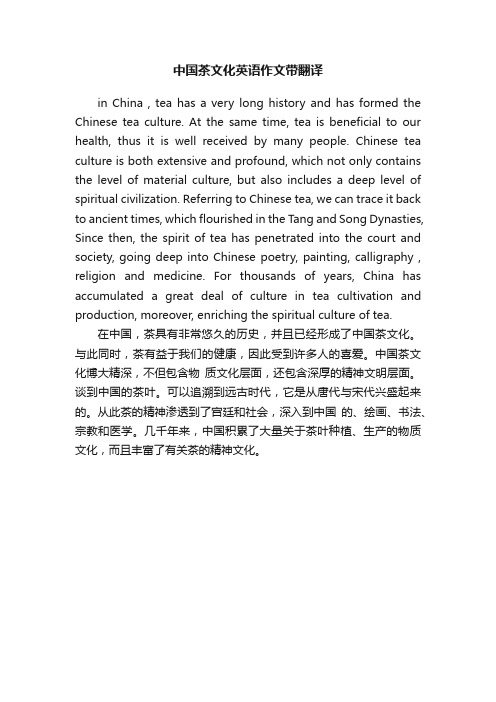
中国茶文化英语作文带翻译in China , tea has a very long history and has formed the Chinese tea culture. At the same time, tea is beneficial to our health, thus it is well received by many people. Chinese tea culture is both extensive and profound, which not only contains the level of material culture, but also includes a deep level of spiritual civilization. Referring to Chinese tea, we can trace it back to ancient times, which flourished in the Tang and Song Dynasties, Since then, the spirit of tea has penetrated into the court and society, going deep into Chinese poetry, painting, calligraphy , religion and medicine. For thousands of years, China has accumulated a great deal of culture in tea cultivation and production, moreover, enriching the spiritual culture of tea.在中国,茶具有非常悠久的历史,并且已经形成了中国茶文化。
与此同时,茶有益于我们的健康,因此受到许多人的喜爱。
中国茶文化PPT英文版
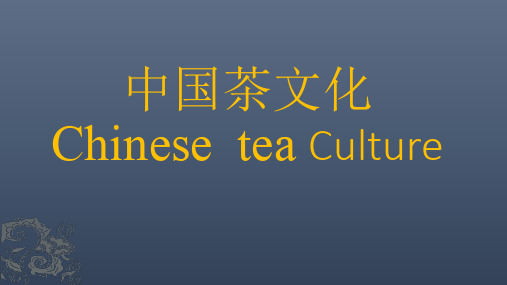
(Writen by Lu Yu, Tang dynasty)
ห้องสมุดไป่ตู้
绿茶; 红茶; 乌龙茶; 黄茶; 白茶;
3.茶的分类 Classification of tea
green tea; black tea; oolong tea; yellow tea; white tea; dark tea (heicha);
•有益健康
health effects;
•我国茶叶礼品
•tea gift of our country;
(4)六安瓜片茶
Liuan guapian tea
•绿茶
Green tea;
•安徽省六安县
Anhui province;
•片茶
piece tea;
• 被中国中央军事委员会指定为特殊茶
designated as the special tea for the Central Military Commission of China;
(5)卢山云雾茶
Lusan yunwu tea;
(6)信阳毛尖茶
Xinyang maojian tea;
(7)铁观音茶
Tie guanyin tea;
(8)武夷岩茶
Wuyi rock tea;
信阳毛尖Xinyang maojian
铁观音Tie guanyin
武夷岩茶Wuyi rock tea
Tea
one of the top ten chinese tea,
•30多个品牌
more than 30 brands;
•中国政府机构每年都购买超过100kgs 的茶叶
the central government of china buy more than100kgs every year;
中国茶文化英语作文带翻译

中国茶文化英语作文带翻译in China , tea has a very long history and has formed the Chinese tea culture. At the same time, tea is beneficial to our health, thus it is well received by many people. Chinese tea culture is both extensive and profound, which not only contains the level of material culture, but also includes a deep level of spiritual civilization. Referring to Chinese tea, we can trace it back to ancient times, which flourished in the Tang and Song Dynasties, Since then, the spirit of tea has penetrated into the court and society, going deep into Chinese poetry, painting, calligraphy , religion and medicine. For thousands of years, China has accumulated a great deal of culture in tea cultivation and production, moreover, enriching the spiritual culture of tea.在中国,茶具有非常悠久的历史,并且已经形成了中国茶文化。
与此同时,茶有益于我们的健康,因此受到许多人的喜爱。
[传统文化]中国茶文化英语介绍
![[传统文化]中国茶文化英语介绍](https://img.taocdn.com/s3/m/bd87729d185f312b3169a45177232f60ddcce7b6.png)
柴早 米晨 油起 盐来 酱七 醋件 茶事 。,
C h i n e s e T e a C u l t u r e 2024/3/4
3
The History Of Tea Drinking
“Shen Nong tasted
a hundred herbs,
at seventy case of
drugs, have tea and
7
Lu Yu &Tea Classics
The Tea Classics is the Cornerstone of Chinese culture, by Lu Yu, who Is know as the “Tea Sage”.
C h i n e s e T e a C u l t u r e 2024/3/4
I T
bad health.
S
C h i n e s e T e a C u l t u r e 2024/3/4
12
Categories Of Tea
B
E
It warms the stomach
N E
and helps with digestion.
F
It is most suitable
I T
22
Other Uses Of Tea
C h i n e s e T源自e a C u l t u r e 2024/3/4
23
Other Uses Of Tea
C h i n e s e T e a C u l t u r e 2024/3/4
24
C h i n e s e T e a C u l t u r e 2024/3/4
18
中国茶文化 英语介绍

中国茶文化英语介绍Chinese Tea Culture: An IntroductionTea, a timeless beverage that has captivated the hearts and minds of people around the world, holds a particularly significant place in the rich tapestry of Chinese culture. Steeped in history, tradition, and a deep appreciation for the art of tea-making, the Chinese tea culture is a testament to the enduring allure of this humble yet extraordinary drink.At the heart of Chinese tea culture lies a profound reverence for the natural world and a deep-rooted understanding of the delicate balance between man and nature. The cultivation of tea leaves is a meticulous process that requires immense skill, patience, and a profound respect for the land. From the tender plucking of the fragrant leaves to the intricate processing methods, each step in the tea-making journey is imbued with a sense of reverence and a deep connection to the earth.One of the most striking aspects of Chinese tea culture is the diversity of tea varieties that have emerged over centuries of experimentation and innovation. From the delicate and floral greenteas to the robust and earthy Pu-erh teas, the Chinese tea landscape is a kaleidoscope of flavors, aromas, and textures, each offering a unique sensory experience. This diversity is a testament to the ingenuity and dedication of Chinese tea masters, who have continuously pushed the boundaries of tea-making to create a truly remarkable array of offerings.Alongside the rich tapestry of tea varieties, the Chinese tea culture has also given birth to a sophisticated and nuanced tea ceremony known as the Gongfu Cha. This ritualized practice of tea preparation and consumption is not merely a functional exercise, but rather a profound expression of the harmony between the physical and the spiritual. From the meticulous selection of tea leaves and vessels to the intricate choreography of pouring and serving, the Gongfu Cha ceremony is a symphony of sights, sounds, and sensations that transport the participant into a realm of tranquility and contemplation.The significance of tea in Chinese culture extends far beyond its culinary and aesthetic dimensions. Tea has long been intertwined with the philosophical and spiritual traditions of China, serving as a bridge between the material and the ethereal. The ancient Chinese scholars and sages often turned to tea as a means of cultivating mindfulness, tranquility, and a deeper connection with the natural world. In this way, tea has become a vessel for the transmission ofwisdom, a tool for contemplation, and a conduit for the exploration of the human experience.Moreover, the culture of tea has profoundly shaped the social fabric of China, influencing everything from the way people gather and converse to the rituals and customs that define everyday life. Tea houses, once havens for scholars, poets, and politicians, have evolved into vibrant hubs of community and cultural exchange, where ideas are shared, connections are forged, and the timeless tradition of tea-drinking continues to thrive.As the world becomes increasingly interconnected, the Chinese tea culture has gained a global following, captivating the hearts and minds of tea enthusiasts across the globe. From the bustling streets of Beijing to the serene gardens of Hangzhou, the story of Chinese tea continues to unfold, inviting people to immerse themselves in a world of timeless traditions, sensory delights, and a profound appreciation for the beauty of the natural world.In conclusion, the Chinese tea culture is a rich and multifaceted tapestry that weaves together the threads of history, philosophy, and the enduring human quest for connection and contemplation. Through the simple yet profound act of tea-drinking, the Chinese people have created a legacy that transcends borders and time,inspiring a deeper understanding and appreciation of the natural world and the enduring power of human creativity and innovation.。
大学英语作文之中国茶文化 Chinese tea culture
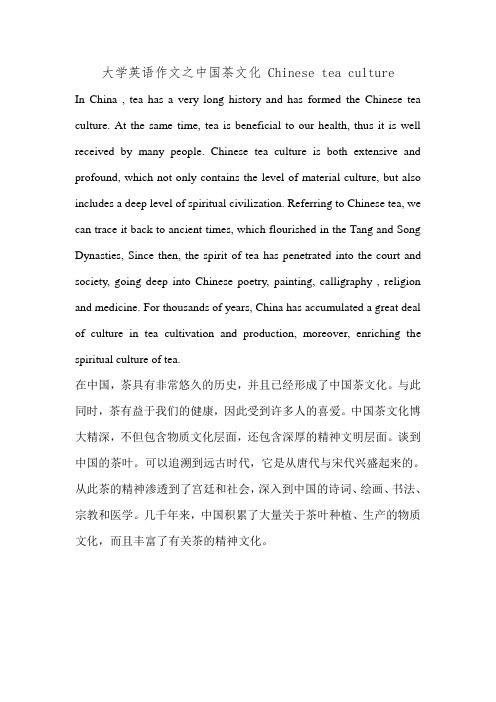
大学英语作文之中国茶文化 Chinese tea cultureIn China , tea has a very long history and has formed the Chinese tea culture. At the same time, tea is beneficial to our health, thus it is well received by many people. Chinese tea culture is both extensive and profound, which not only contains the level of material culture, but also includes a deep level of spiritual civilization. Referring to Chinese tea, we can trace it back to ancient times, which flourished in the Tang and Song Dynasties, Since then, the spirit of tea has penetrated into the court and society, going deep into Chinese poetry, painting, calligraphy , religion and medicine. For thousands of years, China has accumulated a great deal of culture in tea cultivation and production, moreover, enriching the spiritual culture of tea.在中国,茶具有非常悠久的历史,并且已经形成了中国茶文化。
中国茶文化-英语

Chinese tea culture(中国茶文化-英文版)The Chinese people, in their drinking of tea, place much significance on the act of "savoring." "Savoring tea" is not only a way to discern (识别,辨别)good tea from mediocre (普通的,平凡的)tea, but also how people take delight in their reverie(沉思)and in tea-drinking itself. Snatching a bit of leisure from a busy schedule, making a kettle of strong tea, securing a serene (平静的,安详的)space, and serving and drinking tea by yourself can help banish fatigue and frustration, improve your thinking ability and inspire you with enthusiasm. You may also imbibe(啜)it slowly in small sips to appreciate the subtle allure of tea-drinking, until your spirits soar up and up into a sublime(超群的)aesthetic(美的,美学的)realm(领域). Buildings, gardens, ornaments and tea sets are the elements that form the ambience (气氛,周围环境)for savoring tea. A tranquil, refreshing, comfortable and neat locale is certainly desirable for drinking tea. Chinese gardens are well known in the world and beautiful Chinese landscapes are too numerous to count. Teahouses tucked away in gardens and nestled beside the natural beauty of mountains and rivers are enchanting places of repose for people to rest and recreate themselves.China is a country with a time-honored civilization and a land of ceremony and decorum. Whenever guests visit, it is necessary to make and serve tea to them. Before serving tea, you may ask them for their preferences as to what kind of tea they fancy and serve them the tea in the most appropriate teacups. In the course of serving tea, the host should take careful note of how much water is remaining in the cups and in the kettle. Usually, if the tea is made in a teacup, boiling water should be added after half of the cup has been consumed; and thus the cup is kept filled so that the tea retains the same bouquet and remains pleasantly warm throughout the entire course of tea-drinking. Snacks, sweets and other dishes may be served at tea time to complement the fragrance of the tea and to allay one‘s hunger中国人饮茶,注重一个“品”字。
chinese tea culture 中国茶文化英文介绍
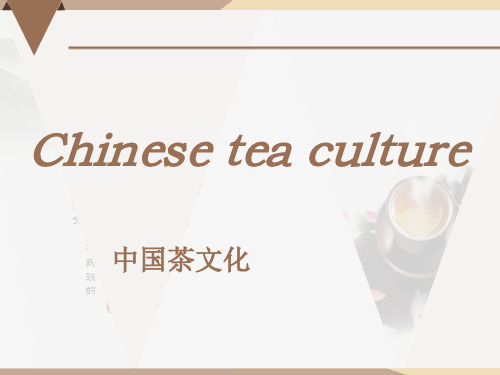
中国茶文化
History of the Tea
China is the initial place of tea and also the fist country to discover the tea tree and make use of it. Early back to primitive society, tea has been used as medicine. Tea has been found in the record documents of China'Zhou dynasty about 1100BC. People began to drink tea in their daily life and the appeared the market of tea in 100BC. Drinking tea became a fashion in Xijin dynasty and Tang dynasty .
注:1.AD公元 2.promote促进
Shen Nong Shi, the God of Agriculture, was believed to be the first to discover tea. In his Book of Herbs(神农本草经), it says that “Shen Nong shi personally tasted hundreds of species of herbs and he was hit by 72 poisons in a single day.
注:1.initial最初的2.primitive原始的 3.documents证明4.fashion时尚 5.BC公元前
中国茶文化(中英双语)
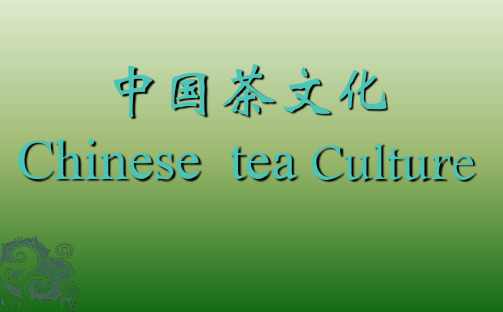
Tea
小结:
几千年来中国不但积累了大量关于茶叶种植、生产 的物质文化、更积累了丰富的有关茶的精神文化, 这就是中国特有的茶文化,属于文化学范畴。
Summary: For thousands of years China has not only accumulated a great deal about tea cultivation, production of material culture, but also accumulated rich spirit of the tea culture, which is unique to China's tea culture, a cultural study areas.
(2)洞庭碧螺春茶
Dongting biluochun tea
•绿茶 green tea; •中国十大名茶之一 one of the top ten chinese tea; •一个勤劳,善良的孤女,名叫碧螺; a hard-working, kind-hearted orphan girl, biluo.
绿茶; 红茶;
3.茶的分类 Classification of tea
green tea;
black tea;
乌龙茶; oolong tea; 黄茶; yellow tea;
绿茶green tea
Байду номын сангаас
白茶;
white tea;
黑茶;
dark tea (heicha);
红茶black tea
黄茶yellow tea
可以说,中国是茶的故乡,茶已成为国饮。
We can say, China is the homeland of tea, and tea have become the national drink.
中国茶文化英文版

During the tea ceremony, guests are served the tea in small cups, which are held around the tea table Guests are expected to recommend the tea, its aroma, taste, and appearance, while also engaging in political conversation with their hosts
Chinese tea culture has also become a unique part of global culture, with many tea houses and tea culture centers opening in differபைடு நூலகம்nt parts of the world
The Flavor and Aroma of Chinese Tea
• Chinese tea has a rich and diverse flavor profile that ranges from light and floral to rich and malty The flag and arc of Chinese tea vary depending on the type of tea leaves used, the brewing method employed, and the water quality
chinese tea culture 中国茶文化英文介绍

“Tea Jing”(茶经) written by Lu Yu in 760AD was the first book of tea in the world, which promote the development of tea culture.
Chinese tea culture
中国茶文化
History of the Tea
China is the initial place of tea and also the fist country to discover the tea tree and make use of it. Early back to primitive society, tea has been used as medicine. Tea has been found in the record documents of China'Zhou dynasty about 1100BC. People began to drink tea in their daily life and the appeared the market of tea in 100BC. Drinking tea became a fashion in Xijin dynasty and Tang dynasty .
注:1.AD公元 2.promote促进
Shen Nong Shi, the God of Agriculture, was believed to be the first to discover tea. In his Book of Herbs(神农本草经), it says that “Shen Nong shi personally tasted hundreds of species of herbs and he was hit by 72 poisons in a single day.
- 关于中国茶文化的英语作文带翻译

关于中国茶文化的英语作文带翻译关于中国茶文化的英语作文带翻译篇一:中国茶文化In China, tea has a very long history, and has formed a Chinese tea culture. At the same time, tea is good for our health and is loved by many people. Chinese tea culture is broad and profound. It includes not only material culture, but also profound spiritual civilization. Talking about Chinese tea. Can be traced back to ancient times, it is from the Tang Dynasty and Song Dynasty flourished.From then on, the spirit of tea permeated the court and society, and went deep into Chinese poetry, painting, calligraphy, religion and medicine. For thousands of years, China has accumulated a large number of tea cultivation and production of material culture, but also enriched the spiritual culture of tea.【参考译文】在中国,茶具有非常悠久的历史,并且已经形成了中国茶文化。
与此同时,茶有益于我们的健康,因此受到许多人的喜爱。
中国茶文化博大精深,不但包含物质文化层面,还包含深厚的精神文明层面。
茶文化和茶道的英文翻译
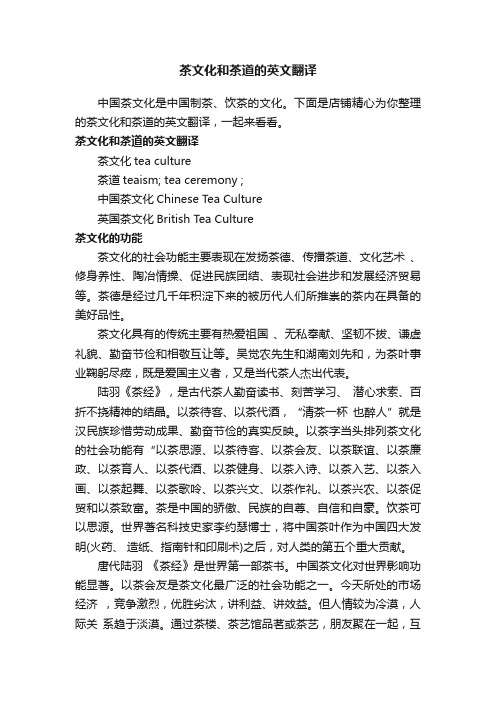
茶文化和茶道的英文翻译中国茶文化是中国制茶、饮茶的文化。
下面是店铺精心为你整理的茶文化和茶道的英文翻译,一起来看看。
茶文化和茶道的英文翻译茶文化tea culture茶道teaism; tea ceremony ;中国茶文化Chinese Tea Culture英国茶文化British Tea Culture茶文化的功能茶文化的社会功能主要表现在发扬茶德、传播茶道、文化艺术、修身养性、陶冶情操、促进民族团结、表现社会进步和发展经济贸易等。
茶德是经过几千年积淀下来的被历代人们所推崇的茶内在具备的美好品性。
茶文化具有的传统主要有热爱祖国、无私奉献、坚韧不拔、谦虚礼貌、勤奋节俭和相敬互让等。
吴觉农先生和湖南刘先和,为茶叶事业鞠躬尽瘁,既是爱国主义者,又是当代茶人杰出代表。
陆羽《茶经》,是古代茶人勤奋读书、刻苦学习、潜心求索、百折不挠精神的结晶。
以茶待客、以茶代酒,“清茶一杯也醉人”就是汉民族珍惜劳动成果、勤奋节俭的真实反映。
以茶字当头排列茶文化的社会功能有“以茶思源、以茶待客、以茶会友、以茶联谊、以茶廉政、以茶育人、以茶代酒、以茶健身、以茶入诗、以茶入艺、以茶入画、以茶起舞、以茶歌呤、以茶兴文、以茶作礼、以茶兴农、以茶促贸和以茶致富。
茶是中国的骄傲、民族的自尊、自信和自豪。
饮茶可以思源。
世界著名科技史家李约瑟博士,将中国茶叶作为中国四大发明(火药、造纸、指南针和印刷术)之后,对人类的第五个重大贡献。
唐代陆羽《茶经》是世界第一部茶书。
中国茶文化对世界影响功能显著。
以茶会友是茶文化最广泛的社会功能之一。
今天所处的市场经济,竞争激烈,优胜劣汰,讲利益、讲效益。
但人情较为冷漠,人际关系趋于淡漠。
通过茶楼、茶艺馆品茗或茶艺,朋友聚在一起,互通信息,交流感情,增进了解,沟通友谊。
朋友相聚在旧式茶馆里,随意说笑,回忆人生,重新享受到生命的乐趣。
古代就有“寒夜客来茶当酒”之说,以茶代酒体现传统美德,符合今天中央倡导的厉行节约制止奢侈浪费行为的规定要求。
中国的茶文化英文介绍
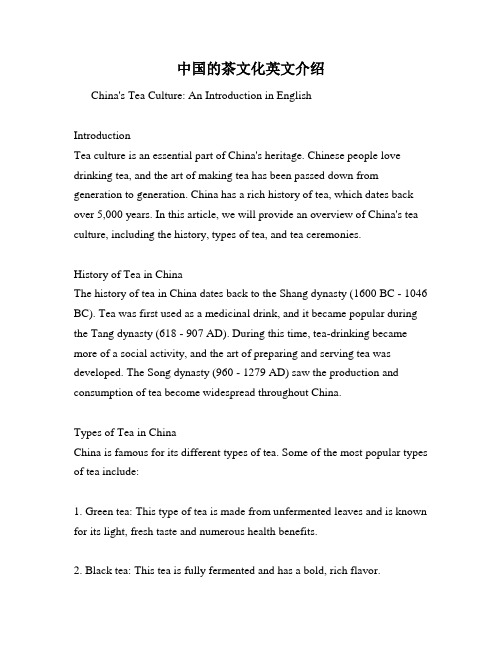
中国的茶文化英文介绍China's Tea Culture: An Introduction in EnglishIntroductionTea culture is an essential part of China's heritage. Chinese people love drinking tea, and the art of making tea has been passed down from generation to generation. China has a rich history of tea, which dates back over 5,000 years. In this article, we will provide an overview of China's tea culture, including the history, types of tea, and tea ceremonies.History of Tea in ChinaThe history of tea in China dates back to the Shang dynasty (1600 BC - 1046 BC). Tea was first used as a medicinal drink, and it became popular during the Tang dynasty (618 - 907 AD). During this time, tea-drinking became more of a social activity, and the art of preparing and serving tea was developed. The Song dynasty (960 - 1279 AD) saw the production and consumption of tea become widespread throughout China.Types of Tea in ChinaChina is famous for its different types of tea. Some of the most popular types of tea include:1. Green tea: This type of tea is made from unfermented leaves and is known for its light, fresh taste and numerous health benefits.2. Black tea: This tea is fully fermented and has a bold, rich flavor.3. Oolong tea: This tea is partially fermented, giving it a unique flavor that is not as strong as black tea and not as delicate as green tea.4. White tea: This delicate tea is made from young leaves and buds, which are picked in early spring.5. Pu-erh tea: This is a fermented tea that has a unique flavor and aroma. It is often aged for many years, and some types can be as old as 50 years.Tea Ceremonies in ChinaTea ceremonies are an important part of China's tea culture. These ceremonies have been developed over centuries, and they differ depending on the region and the type of tea being served. A tea ceremony typically involves several steps, including washing the teapot, warming the cups, and steeping the tea. The ceremony is often accompanied by poetry, calligraphy, or even music. The purpose of the tea ceremony is to create a special experience for the guests, where they can relax, enjoy the tea, and appreciate the beauty of the surroundings.ConclusionChina's tea culture is an essential part of Chinese life. It has a rich history, which has been passed down from generation to generation. Chinese people love drinking tea, and it has become an essential part of their social life. China has many different types of tea, each with its unique flavor and aroma. Lastly, the tea ceremony is an essential part of China's tea culture, and it is an experience that is not to be missed.。
- 1、下载文档前请自行甄别文档内容的完整性,平台不提供额外的编辑、内容补充、找答案等附加服务。
- 2、"仅部分预览"的文档,不可在线预览部分如存在完整性等问题,可反馈申请退款(可完整预览的文档不适用该条件!)。
- 3、如文档侵犯您的权益,请联系客服反馈,我们会尽快为您处理(人工客服工作时间:9:00-18:30)。
中国茶文化及对中国的影响Chinese tea culture and the influence on Chinese culture姓名:王金星专业:英语语言文学系年级:EL084Chinese tea cultureThe Chinese people, in their drinking of tea, place much significance on the act of "savoring." "Savoring tea" is not only a way to discern good tea from mediocre tea, but also how people take delight in their reverie and in tea-drinking itself. Snatching a bit of leisure from a busy schedule, making a kettle of strong tea, securing a serene space, and serving and drinking tea by yourself can help banish fatigue and frustration, improve your thinking ability and inspire you with enthusiasm. You may also imbibe it slowly in small sips to appreciate the subtle allure of tea-drinking, until your spirits soar up and up into a sublime aesthetic realm. Buildings, gardens, ornaments and tea sets are the elements that form the ambience for savoring tea. A tranquil, refreshing, comfortable and neat locale is certainly desirable for drinking tea. Chinese gardens are well known in the world and beautiful Chinese landscapes are too numerous to count. Teahouses tucked away in gardens and nestled beside the natural beauty of mountains and rivers are enchanting places of repose for people to rest and recreate themselves.China is a country with a time-honored civilization and a land of ceremony and decorum. Whenever guests visit, it is necessary to make and serve tea to them. Before serving tea, you may ask them for their preferences as to what kind of tea they fancy and serve them the tea in the most appropriate teacups. In the course of serving tea, the host should take careful note of how much water is remaining in the cups and in the kettle. Usually, if the tea is made in a teacup, boiling water should be added after half of the cup has been consumed; and thus the cup is kept filled so that the tea retains the same bouquet and remains pleasantly warm throughout the entire course of tea-drinking. Snacks, sweets and other dishes may be served at tea time to complement the fragrance of the tea and to allay one’s hunger.The formation and development of Chinese tea cultureChina is the hometown of tea, is the world's first discovery of tea, tea and the use of tea cultivation countries. The origin of tea at least the main Qi Wannian history. Tea was found and the use of human, about Siwuqiannian history.In accordance with "The Book of Songs" and other relevant documentation, in the pre-history, "Tu" refers to all types of wild plants bitterness of food raw materials. Fresh medical unity in the history of the times, the Zhike tea vegetable oil, the Qing God, Xiaoshi, in addition to Zhang, medical function is to facilitate wait until it is not difficult for people found. However, the general medical practices for the development of an exclusive drink often, there must also be some special factors, namely, real-life people in a particular need. Bashu region, to the multiple for Jiyi "Zhang smoke" land. "Barbarian people living with tea, the lack of will." (Ai Qing weeks of "Zhu Guo Travels" V olume II) is often vulgar Bashu people eating spicy side, thousands of habit, still. It is this natural geographical conditions and the resulting decision of the people's dietary practices, making Bashu people first "JIANCHALING" Apart from taking to Zhang Qi, antipyretic drugs. Jiufu-Xi, amedicinal purpose gradually Subduction, tea has become a daily drink was. Qin-Ba-Shu, is likely to see this as a daily drink tea customs.Tea from medicinal drink into a regular habit, the strict sense of "tea" would then have its typical signs that "tea" (cha) the emergence of sound. Guo Pu Note "Yi-release", "Jia": "small trees such as gardenia, Dong-Sheng Ye, can be boiled for soup to drink. As early as today called for the mining, tea, who was admitted late Ming, a Chuan, Shuren of the TU. "Clearly, the Han," Tu "has been specifically beverage word" tea "in pronunciation," tea "from" Tu "isolated, and embarked on the" independence "road of development. But "tea" the emergence of the word is accompanied by the development of the tea things and commercial activities have become increasingly frequent, until later in the Tang Dynasty, is also in line with the new symbol of a people's social life after such a text change in the law.China will start from the tea, There are different theories about, the Western Han Dynasty, tea drinking has been a matter of the official literature, drinking tea when the starting time earlier than some. Tea appears to cultural characteristics, in the Han, Wei and Jin Dynasty, Northern and Southern Dynasties period.Tea Culture Broadly speaking, the tea at the natural sciences and humanities tea in terms of both human society is in the process of historical practice of creating and tea-related material and spiritual wealth combined. In a narrow sense, focusing on the human sciences tea, tea mainly refers to the spiritual and social functions. As the science of tea has become an independent system, which now often say the tea culture emphasis on the humanities.The influence of tea culture on Chinese civilization1、the three countries before the tea culture of the EnlightenmentMany of the books found that the tea set for 2737-2697 BC, its history can be pushed to Sanhuangwudi. Eastern Han Hua, "The Fresh": "Kucha for food, meaning benefits" of the medical records of the value of tea. Western Han Dynasty tea to the county of origin named "Tu-Ling", that is, Hunan Chaling. To San Guowei generation "-Blair" has the earliest documented the method of tea cakes and drinking: Story of the Pakistani Inter-for cake, pie-old man leaves to a paste of rice. Tea in the form of material and infiltration to other human sciences and the formation of tea culture.2、Jin Dynasty, the seeds of the Northern and Southern Dynasties tea cultureWith the rise of the literati tea, the tea poetry Gough increasingly available, tea has been out as a general form of eating into the cultural circles, will play the spirit of social role. Jin Dynasty, Northern and Southern Dynasties period, Menfa system has been formed, not only the emperor, nobility amassed a wave of officials and scholars generally proud boast, multi-effect Plaster Liang Hou Wei. In this case, some people of insight to "Yang Lian." Thus, there is satisfied that the land, Huanwen to tea and wine at all. South Qishizuwu emperor is a relatively enlightened emperor, he did not Hei Yu Yan, under Yi Zhao before his death, he said after the funeral to be thrifty as possible, not to Sansheng for offerings, only put more Ganfan, fruit cake and Chafan can. And to "the world Guijian, with such a system." Satisfied that the land, Huanwen, Emperor Wu Qi, where tea is not only refreshing to quench their thirst, it began workin a community, into a tea hospitality, to worship and that a Kind of spirit and sentiment of the means. Tea has not entirely the use of its natural value used by the people, but entered the spirit of the area.Wei, Jin and Southern and Northern Dynasties period, the world disorder, all kinds of ideological and cultural exchanges collision, supernaturalism very popular. Metaphysics is the period of the Wei, Jin, a philosophical ideas, mainly糅合Confucian thinking of the Lao Zi and Zhuang Zi-yi. Xuan Xuejia most of the so-called Fellows, the first to the door, the face, the instrument only, Hyun-loving nothingness from the light. Eastern Jin Dynasty, furans North Korea, the affluent Kangnam Scholars to be temporary to meet, hang around all day in Qingshanxiushui between the light winds to continue to develop, resulting in many light home. Initially there are more than idle talk Jiutu home, and later, talk of the wind gradually developed to the general literati. Xuanxue Jia-speech, also general-talk rhetoric. Liquor make people excited, but drinking more would be stricken manner, nonsense, failed Yaguan. The tea-drinking and may be Jingri always clear, it is clear thinking, calm attitude. Moreover, the general terms of the literati, the whole day dealing with Jiurou, of the economy, will not allow. Days, many Xuan Xuejia, talk to wine home from the village. In them, where tea has been treated as a mental phenomenon.With Buddhism, Taoism up, and have tea and Buddhism, Taoism linked. In Taoism, the tea is to help Lian "inner alchemy" or-down muddy, light-weight-for-bones, Xiu Changshengbulao a good way to the body in Buddhism, the tea is a brooding meditation required of Of the show. Although this has not yet formed a complete religious tea ceremony and the ideological principles set out tea, but tea has been divorced from the diet as a form of state, has significant social, cultural functions, the Chinese tea culture clues.3、the formation of the Tang Dynasty tea culture780, Lu Yu, "the tea," tea culture of the Tang Dynasty is a landmark. Tea has summed up its natural and human sciences double content of the tea arts, Confucianism, Taoism, Buddhism into the three tea, the pioneering spirit of the Chinese tea ceremony. After tea and a large number of books, poems tea, "tea in", "JIANCHALING water", "Cai Cha", "16 soups." Tang tea culture and the formation of the Zen on the rise, the benefits of tea is refreshing thought, spermatogenic Zhike function, the temple advocates tea, tea trees planted around the temple, the development of the tea ceremony, a tea appear, the first election of tea, The matter was tea activities. China's Tang Dynasty in the form of tea ceremony at the palace tea, the tea ceremony of the temple, the literati tea ceremony.4、the prosperity of the Song Dynasty tea cultureSong tea has been a great development, and promote the development of the tea culture, the literati in a professional Tea Associations, an official of the "social soup", a Buddhist, "1,000 clubs." Song Taizu Zhao Kuangyin tea is a of disabilities, in court and authorities in the establishment of tea things, the court has been using tea grades. Tea-ceremony system has become, thanks to win over Secretary of tea has become the emperor, with relatives an important means, but also give foreign envoys. As for the lower social and vitality of tea culture is more lively, some of movement, theneighbourhood to "Xiancha" You Ke, to respect the "gold ingot tea", when engaged to "tea", the time of the marriage to "the tea", when roommate "A tea." Cha Doo civil wind, has brought Preparing cooking point of a series of changes.Since the Yuan Dynasty, the tea culture has entered a period of twists and turns. Song expansion of the tea culture and the social dimension of cultural forms, tea things are booming, but the tea to complicated, trivial, luxury, lost the Tang Dynasty tea culture profound ideological connotation, too delicate tea flooded the spirit of the tea culture, lost Its noble profound nature. In court, nobles, scholars there, drinking tea became a "drink at the child" and "drinking style," and "Play tea."5、that the universal culture of Qing-ChaAt this point there has been steaming green, Chaoqing, Hong Qing, and other tea, tea drinking has been changed to "minority bubble", many of the Ming Dynasty scholar Aston handed down the left for, such as snowster "Pengcha picture," " Tea map ", Wen Zhengming's" Huishan tea party "," Lu Yu Pengcha plans, "" Tea plans. " The increase in tea, tea art are different, the style of Tea Ware, texture, pattern Qianzibaitai. Tea exports to the Qing Dynasty has become one of the official sector, the tea, tea, tea countless poems.6、the development of modern tea cultureAfter the founding of New China, China's annual output of tea from 1949 to 7500 T development in 1998, more than 60 million T. Tea a substantial increase in material wealth for the development of China's tea culture to provide a solid foundation in 1982, set up in Hangzhou, the first to promote tea culture for the purpose of social groups - the "tea house", established in 1983 in Hubei " Lu Yu Tea Culture Research Society, "1990" were the Federation of Chinese tea "was set up in Beijing, 1993," the China International Tea Culture Research Society "in the establishment of Island Lake, in 1991 China Tea Museum in Hangzhou West Lake Township officially opened. 1998 China International Tea Cultural Exchange Peace Museum completed. With the rise of tea culture and tea houses throughout the run more. International Tea Culture Symposium has been opened to the fifth sector, has attracted Japan, South Korea, the United States, Sri Lanka and Hong Kong and Taiwan have participated. The main provincial cities and counties in the tea production in the host "Tea Day", such as Fujian's Wuyi Yancha section of the city, Yunnan's Pu'er tea festival, Zhejiang Xinchang, Taishun, Hubei and Britain Hill, the Tea Festival in Xinyang, Henan abound. To have tea as the carrier, to promote comprehensive economic and trade development.Chinese tea culture and tea culture in Europe and America or Japan, a great difference. Chinese tea culture has a long history, profound, not only contains the material and cultural level, also contains a deep spiritual level. Tea by Lu Yu of the Tang Dynasty in the history of Chinese tea culture and sounded the horn. Since then, the spirit of tea permeates the court and society, into the Chinese poetry, painting, calligraphy, religion, medicine. For thousands of years China has not only accumulated a great deal about tea cultivation, production of material culture, but also accumulated rich spirit of the tea culture, which is unique to China's tea culture, a cultural study areas.。
